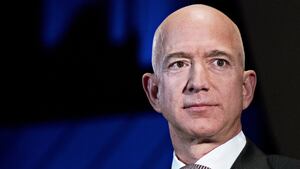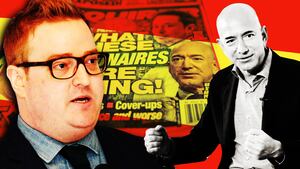It may have shocked the world when the publisher of the National Enquirer allegedly tried to use nude pictures to coerce Jeff Bezos. But it came as no surprise to three veterans of the Enquirer’s parent company, American Media Inc.
“The threats, the blackmail, that’s their business model,” one former National Enquirer staffer told The Daily Beast.
That model burst out into public view on Thursday night when Bezos—the world’s richest man, the founder of Amazon, and the owner of The Washington Post—published emails from AMI chief content officer Dylan Howard that threatened the release of a “d*ck pick” if the Post didn’t relent in its investigation of AMI.
It was a familiar moment to Paul Barresi, a private investigator who spent years working on cases that informed stories in AMI and other tabloids. “The National Enquirer had some people who would go to a celebrity and say, ‘unless you give in to a one-on-one interview that would amount to a fluff piece with us, we’re going to report XYZ,” he said. “The celebrity would then acquiesce to their demand.”
“The nice way of calling it was quid pro quo, but really it was blackmail,” Barresi said. “I know that the same methodology is practiced today,” he added. “Obviously it's practiced, because they did it” to Bezos.
And Daniel “Danno” Hanks, who said he worked as an on-contract investigator for the Enquirer “off and on” for 40 years, used the phrase “war of blackmail” to describe the AMI empire’s ethos.
“I’ve known this newspaper’s tactics for years, and I’d rather the truth be told,” Hanks said.
“The Enquirer had a list of which attorneys worked for which celebrities, and if someone approached [the tabloid] for a story, they would approach the attorneys and say, ‘Make us a better offer,’” Hanks said.
Hanks, who was recently released from prison for involvement in a gambling and drug organization (Hanks claims he was duped into it), added that those Hollywood or celebrity lawyers often asked Enquirer investigators to do investigative work and “trash runs” for them.
“They would have a particular name, and we would track that person down, and once we did that information would be turned over to [the celebrity’s] lawyer,” he said.
Actor Terry Crews said in a tweet Friday that he was the target of a blackmail attempt.
AMI did not respond to a request to comment for this story, but the company said in a statement on Friday that it “believes fervently that it acted lawfully in the reporting of the story of Mr. Bezos.” The company has not been prosecuted for any crimes related to the blackmail claims made by its former investigators.
However, the supermarket tabloid company’s bag of dirty tricks is well-chronicled and includes catch-and-kill operations: paying for an exclusive interview only to bury it, as a favor to an ally or after using the dirt to convince a celebrity to play ball with them.
As The Daily Beast reported last year, the National Enquirer offered to pay for an interview with one of Bill Cosby’s accusers in 2005, then allegedly turned over the file to the comedian in exchange for an exclusive sit-down with him. The Los Angeles Times has reported that in 2003, the Enquirer paid a woman $20,000 for an exclusive about an alleged affair with Arnold Schwarzenegger, then never ran it and made Schwarzenegger a consultant for AMI magazines.
Most infamously, AMI has admitted it paid ex-Playboy model Karen McDougal $150,000 in hush money for her story of an affair with Donald Trump, which never saw the light of day, and AMI reportedly also tried to buy off Italian model Ambra Battilana after she accused movie mogul Harvey Weinstein of groping her. (According to Ronan Farrow in The New Yorker, Howard collected and turned over damaging information about Rose McGowan to Weinstein to help him discredit her rape claim.)
The Wall Street Journal reported in 2009 that two years earlier, AMI obtained photographs that showed golf star Tiger Woods having an affair. They didn’t run a story in the National Enquirer; instead, they cut a deal with Woods to appear on the cover of Men’s Fitness, an AMI title.
AMI’s strong-arm tactics aren’t limited to celebrities and public figures; it sics high-paid lawyers on journalists who try to shine a light on its practices.
Ronan Farrow tweeted Thursday night that he and another prominent journalist who was reporting on AMI’s cozy relationship with Trump last year “fielded similar ‘stop digging or we’ll ruin you’ blackmail efforts from AMI.”
And while The Daily Beast was in the middle of reporting on a Bezos-funded investigation into how his texts wound up in the Enquirer’s hands, AMI threatened Beast reporter Lachlan Cartwright—an AMI veteran—with a $5 million lawsuit, and accused The Daily Beast of so-called “tortious interference”—messing with an AMI contract.
AMI exec Dylan Howard individually threatened the Associated Press with legal action over a story the wire service published accusing him of sexual misconduct, according to former AP editor Ted Bridis and one other source with direct knowledge.
Separately, when the Associated Press was preparing a story that would reveal AMI had effectively paid hush money to a source accusing Trump of fathering an illegitimate child, AMI hired the powerful law firm Boies Schiller Flexner to apply, in Birdis' words, “a continuous amount of pressure to get us to abandon our reporting.”
Ultimately, the Associated Press’ story ran, but only after months of delays. An AP spokesperson told The Daily Beast the wire service did not initially publish the story because editors believed it did not meet the company’s standards.
Two sources with knowledge said lawyers, acting on behalf of AMI, also threatened legal action against the Wall Street Journal when the paper attempted to report on AMI’s role in keeping the Trump love child rumors under wraps.
Aggressive lawyers like Boies Schiller Flexner and Lanny Davis—who also happens to now represent former Trump fixer Michael Cohen—were tools of intimidation, according to those sources.
Boies Schiller did not respond to requests to comment for this story. After it was first posted, Davis said that “my main representation involvement with AMI—I forget the date. More than a year ago I think.” He recalled that “I started the meeting with the AP editor, two reporters and their lawyer, which was on the record, that it was not my intent to persuade AP not to run the story or to threaten any legal action. I never threatened a tortious interference case. The threat may have come from another AMI law firm. In any event, I consider such a threat ridiculous if it occurred.”
Separate from attorneys, the private investigator was another weapon in the AMI arsenal.
Hanks described Barresi as a one-time Enquirer “bagman” who knew how to work “the streets” and had a “very persuasive way of talking to people.” He said if someone was approached by Barresi, he could also hint about dirt the Enquirer had found on them, especially if they weren’t pliable to hush money.
Barresi, according to Hanks, has “audio tapes of various attorneys and…reporters saying, like, ‘I’ll trade you that celebrity for that one,’ or ‘If you let this one slide, I’ll give you this other one.’”
In an interview with The Daily Beast, Barresi denied that he engaged in “blackmail” himself, but said such tactics were common in the tabloid world, including AMI. The Enquirer, he said, did not employ him directly, but his investigative work was used to ply stories from the targets of the tabloid’s coverage.
Barresi provided The Daily Beast with an audio clip of one such meeting in 1994 between Mitteager and notorious Los Angeles private investigator Anthony Pellicano, in which the two plotted to blackmail actress Whoopi Goldberg in exchange for spiking a Globe story about rumors that she had been diagnosed with cancer.
Barresi described himself as a fixer for Pellicano, a now-imprisoned PI whose work on behalf of AMI and other tabloids often entailed what Barresi described as “blackmail” on behalf of AMI publications and others in the Hollywood tabloid industry.
Barresi, a former adult film actor, even wrote a memoir about his exploits, and titled the book Hardcore: Porn Star to Hollywood Fixer.
Barresi described himself as Pellicano’s “field guy,“ and a “real-life Ray Donovan.” Barresi said Pellicano would find damaging information about his own clients and acquaintances, feed it to a tabloid, then tell the client the tabloid would kill the story for a one-on-one interview.
“He would use that as a way of lighting a fire and then going back like the fire chief and putting the fire out,” Barresi said of Pellicano, who is jailed on a wiretapping conviction.
More often than not, the tactic worked. Barresi could only recall a couple of celebrities who didn’t cave when presented with the damaging material that Pellicano had fed to the tabloid press.
Hanks said in the old days, most big names wouldn’t dream of trying to fight the Enquirer, but times appear to be changing.
“It used to be that a celebrity or any kind of famous businessman like Bezos would cringe at the thought of something ending up in the Enquirer,” he said. “But as time goes on by, they realize that people are more angry at the Enquirer than they are at them, for exposing someone’s dirty laundry. And I think Jeff Bezos is just the kind of guy who said, ‘I’ve had it. I’m not going to let myself be a victim’… and decided to fight back.”
“This guy has got some balls,” Barresi said of Bezos, “because he’s standing up to them.”
—with additional reporting by Noah Shachtman and Jason McGahan.









